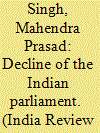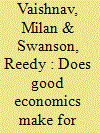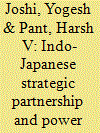| Srl | Item |
| 1 |
ID:
141503


|
|
|
|
|
| Summary/Abstract |
Indian Parliament had a very promising start and worked well during the1950s-1960s. During the 1970s Parliament was squeezed by a great extra-parliamentary mass movement against authoritarianism and corruption and partial but crippling subversion of parliamentary-federal Constitution during the national emergency. Democracy was restored following the 1977 general elections. But the general decline of Parliament that set in the post-Nehru era has not yet been reversed. Major indicators of this decline are shortening sessions, time lost due to disruptions in proceedings by the opposition and violation of norms and precedents by the government, rampant absenteeism, actual hours of sitting as a percentage of available hours, phenomenon of weak legislative federalism via Rajya Sabha in the overall setting of parliamentary-federalism, challenges of new extra-parliamentary mass movements, and judicial activism. The new committee system introduced since 1993 is a welcome development. However, the parliamentary reforms recommended by the constitutional review commission (2002) remain unimplemented.
|
|
|
|
|
|
|
|
|
|
|
|
|
|
|
|
| 2 |
ID:
141498


|
|
|
|
|
| Summary/Abstract |
The proposition that voters reward incumbent governments that perform well economically is considered received wisdom in many democracies. We examine this hypothesis in India, a developing democracy where scholars have found limited evidence of economic voting. Using a unique state-level panel dataset covering the years 1980–2012, we find that there is no relationship between growth and electoral performance in the aggregate. However, since 2000, there do appear to be increasing electoral returns to governments that deliver higher rates of economic growth. The positive returns to growth are much larger than those to improved law and order, while inflation has no clear impact. The results suggest a significant shift in Indian voter behavior.
|
|
|
|
|
|
|
|
|
|
|
|
|
|
|
|
| 3 |
ID:
141500


|
|
|
|
|
| Summary/Abstract |
As the U.S.-led security order in Asia gradually comes under stress, regional powers such as India and Japan are formulating a strategic partnership to hedge against the vulnerabilities accruing out of the unfolding power transition in Asia. China’s unprecedented economic and military rise coupled with America’s perceived relative decline is drawing New Delhi and Tokyo into a strategic embrace. To insure their interests in this era of great power transition, New Delhi and Tokyo are keen to hedge against America’s possible failure in containing China’s growing assertiveness in Asia. This hedging strategy is evident in their growing strategic partnership which consists of a triple hedge: increasing bilateral defense partnership against fears of American retrenchment; economic engagement against an over-dependence on China; and a multilateral hedge against China’s growing influence in international and regional institutions. However, for Asia’s two prominent middle powers, transforming these nascent attempts into an effective strategic response to Asia’s current power transition would also require cooperation in the nuclear domain, an area where their policies continue to diverge.
|
|
|
|
|
|
|
|
|
|
|
|
|
|
|
|
| 4 |
ID:
141501


|
|
|
|
|
| Summary/Abstract |
Inclusive institutions make correct policy choices required for steady catch-up growth more likely. India started out with highly inclusive political institutions since it adopted democracy with universal suffrage at independence. But extractive economic institutions, inherited from the British, were made more so by economic controls. In addition, a heterogeneous electorate allowed politicians to cultivate vote-banks and populist schemes instead of delivering better public services and governance. India’s opening out was adequately nuanced and flexible but was sometimes used as a substitute for harder domestic reforms. It, however, added to the growing constituencies that benefit from growth, and are pushing for more inclusive productivity enabling economic institutions. Broader interest groups create better institutions and incentives. Examples from general governance, the regulation of industry, and agricultural marketing show the process, although messy and prolonged, is in the right direction.
|
|
|
|
|
|
|
|
|
|
|
|
|
|
|
|